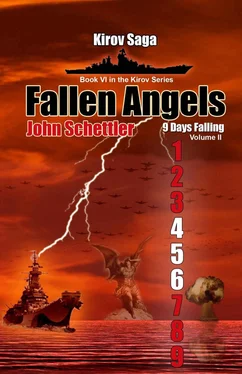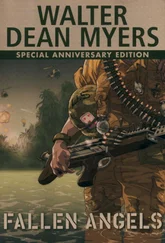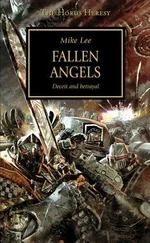“Get a message off to Admiral Nimitz,” said Halsey. “Tell him we have just witnessed what appears to be a large explosion—belay that—tell him the Russians have the goddamned bomb, and they’ve just detonated one after warning me to look out for it ten minutes ago. That ought to make his day, because it sure as hell just spoiled mine.”
* * *
Whenthe news reached Admiral Fraser he was with Chester Nimitz on Guam, preparing to board a plane to rejoin his Task Force 37 in the Sea of Japan. Now he was certain of what would happen if the Americans attacked. He had not been present in the North Atlantic when that first bomb went off, but Admiral of the Fleet, John Tovey had seen it with his own eyes along with his Chief of Staff, Daddy Brind. He remembered all too well what Brind had told him about it.
“Vast and threatening,” he called it. “Threatening in a way that you simply cannot describe—and that was well after the detonation by the time we got within sight of it. I would hate to see one actually go off. Seeing one in a lifetime was more than enough.”
In 1942 when Fraser had advanced to second in command of Home Fleet, Admiral Tovey took him into his confidence on a very delicate matter after the incident in the Mediterranean, one concerning the true nature of the ship Rodney and Nelson had tangled with, and what had really happened after Gibraltar, a story that few men alive had ever heard. Fraser was now one of an elite inner circle known simply as “The Watch” and his code signal was Watchstander G3, number three in the overall chain of command within the group that stretched back to Tovey. Ahead of him in those shadowed ranks were only two men: Admiral Tovey himself and the eccentric but brilliant Alan Turing. He was amazed that Turing would be privy to matters where Churchill was not informed, but Tovey convinced him that bringing the Prime Minister in, and the government, would be no easy task.
Ever since the Geronimo raider had disappeared off the Island of St. Helena, the Watch had come to believe it reappeared in the Pacific soon after, a matter of days in fact, and that was a clear impossibility that had led to the startling conclusion that the ship was not from their time. Beyond that, its weapons were simply too advanced. The Watch had been set on every active sea lane of the world to look out for this ship, and now it had returned, two years later in 1945, back with the bomb.
Where was it going in those intervening years? How did it manage to evade detection? These were questions the Watchstanders had toiled with for long years. Turing was of the opinion that the ship was continually moving in time, perhaps marooned, perhaps under deliberate control. Either way, its continued reappearance was deeply troubling and Fraser had just had a long conversation with Admiral Nimitz about it. Try as he might, he could not persuade the Americans to belay the planned attack being assembled at that very moment by Admiral Halsey.
“The ship is dangerous,” he had argued. “It is unlike any warship afloat, with weapons that can do grave harm in an instant. You could be sacrificing a good part of your Pacific Fleet if your lock horns with this ship and it decides to use the same weaponry it just demonstrated. I strongly advise we parley with this Russian Captain, just as our Admiral John Tovey did. We had four battleships at risk and ready to engage, the core of the entire Home Fleet but—”
“But what did it get you?” Nimitz said quietly. “They reneged on their pledge and slipped away.”
“Yes, but they went to fight the Japanese! Your invasion at Guadalcanal succeeded largely because of their intervention. Yamamoto had another full carrier division heading your way, and this ship stopped it single handedly—at least this is what we have surmised after a couple years good intelligence work.”
“Hard to believe,” said Nimitz. “But the Russians didn’t use anything like that weapon on the Japanese. Hell, if they had the bomb back in 1941 , then why didn’t they use it on the Germans?”
“We don’t know…” Fraser could not reveal the whole truth, not even to Nimitz. “But they didn’t need to. The ship beat the Yamato to a near hulk, and that was with its conventional naval rocketry alone. You can’t beat this ship in anything like a fair fight, Admiral. It will require overwhelming force, and my great fear is that if we concentrate to attack, they will answer with what we just saw—an atomic bomb, just as they did in the North Atlantic when we closed in for the kill.
“So now we’ll have to deal with it on our terms. You British were entirely too accommodating. Is this thing Russian, Admiral? We’ve had the Russian Ambassador on the hot seat for hours and he swears on his first born son that the Soviet government knows nothing whatsoever about this ship.”
“He may be telling the truth, Admiral. That was, in fact, what the commander of that ship asserted when he met with Admiral Tovey.”
“Well how in the world is that possible?” Nimitz sounded irritated now. “They design and build the damn thing, and now you’re telling me they claim to know nothing about it? Sorry, Admiral, but I just can’t buy that line. I think Uncle Joe is blowing smoke in our face, and I put that lightly. I’ve also been advised that President Truman has authorized us to respond in kind if the Russians do actually deploy an atomic weapon in combat against us. We’re drawing a proverbial line in the sand here. The feeling back in Washington is that the Russians have to be reigned in, and quickly. Patton is itching to go after them in Europe right now. They may have the bomb, but they can’t have very many.”
“But don’t you see, Admiral. They’re trying to warn us off. They offered to negotiate. Why not take them up on it? If you attack now they will escalate with more atomic weapons. I’m sure of it.”
“Then that’s exactly what they’ll get in return.”
“But this is insane! How many bombs do you have?”
“That’s not the question we need to ask now, Admiral Fraser. The question is how many do they have.”
“Well, if they can expend one to make of demonstration like this what does that tell you? Our intelligence believes they may have many of these weapons, and that creates a whole new calculus here. It isn’t simply a matter of ships and planes, Admiral, though if you do attack this ship be prepared to lose very many of both in that effort.”
Nimitz took a deep breath. “Admiral Fraser. We just won the Second World War. Now the Russians seem intent on starting another one. So be it. We have the force to win this one too, and atomic weapons in theater if they escalate. I will tell you now that I have been authorized to use them.”
The silence between the two men was thick now. What more could Fraser say? Revealing the true nature of this ship would seem incredulous. Negotiation bought time for the Watch to get more valuable information. Where exactly did the ship come from? Why was it here? What did its officers and crew really want?
But to Nimitz this was just a ship—one of hundreds that had gone to the bottom of the sea in the last four years. It was just a ship with the bomb, and that was all the more believable now because he had planes with the bomb, out there in the Pacific somewhere on one of those tiny islands. One last attack would settle the matter, or so the American point of view was evident now.
The Yanks had been the senior service from the moment they first entered the war on Britain’s side. They were like a well muscled work-horse in the beginning, and one that needed to be broken to the plow harness if they were ever going to get the job done. Thankfully the more seasoned and experience British officers had been there in the beginning. In time, however, the dash and fighting ability of Men like Patton, the dogged perseverance of Omar Bradley, Hodges and so many others, had made all the difference in the war. England could not have prevailed without the United States at her side. Montgomery could not have won without Patton and the others.
Читать дальше











